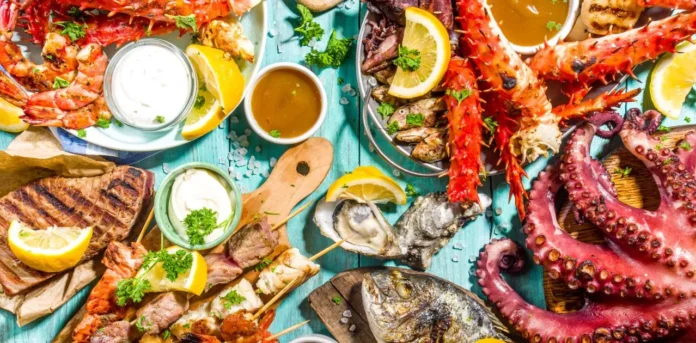More than two-thirds of Irish consumers look for ecolabels when they buy fish and seafood, according to a study! A recent survey by YouGov for the Marine Stewardship Council (MSC) shows that more than two-thirds (68%) of consumers in Ireland actively look for ecological labels when shopping for fish and seafood Statistics, released in anticipation of World Sea Day on 8 June, received responses from over 2,000 Irish people and shed light on a range of consumer preferences and concerns around seafood.
The survey revealed that almost half (47%) of Irish shoppers consider the price of the fish to be a key factor when purchasing seafood. This makes price the second most important consideration after freshness, topping the list at 52%. Such findings suggest that while economic factors are important, product quality remains a priority for consumers.
Furthermore, the survey noted that nearly 49% eat seafood at least once a week, buying mainly from supermarkets rather than independent stores or fishmongers this highlights the importance of supermarket influence in influencing consumer choice and can drive sustainable practices through their product offerings.
The data also reveal a strong belief in ecolabel reliability, with 83% of respondents believing that supermarket reviews of these labels are carried out by independent organisations it helps This indicates that consumers have greater trust in third-party verification of sustainability claims, indicating that such endorsement plays an important role in purchasing decisions.
Commenting on the findings, Seth McCurry, Chief Commercial Officer of MSC UK and Ireland, said: “This survey confirms that public concern about ocean health is growing and it is clear that most are aware of steps that we can move with the customers to protect the environment.”
McCurry highlighted the need to address environmental issues such as sea level rise and climate change, advocate for sustainable fishing practices and joint efforts to prevent overfishing occurred emphasized the importance of making conscious choices to protect marine ecosystems and ensure a stable food source in the future.
The survey also explored general attitudes towards ocean sustainability. Nearly three-quarters (72%) of participants believe their purchasing decisions can have a positive impact on the health of the oceans. In addition, 81% prioritize sustainably sourced fish and seafood. This commitment to sustainable fisheries is further evident in the 75% who believe that protecting fish species is important and supporting sustainable fishing practices, and 82% emphasize the importance of monitoring s you can spot the fish
On a positive note about environmentally conscious consumers, McCurry highlighted that there are more than 350 MSC-labeled fish and seafood products in Ireland Supermarkets such as Tesco, Aldi and Lidl offer a variety of these products many for, with varying tastes and prices -It comes true. This includes popular items such as cod, haddock and salmon, as well as shellfish such as cold water shrimp and Irish mussels.
The MSC estimates that if worldwide fisheries had been controlled more efficaciously, a further sixteen million tonnes of wild seafood would be harvested yearly. This boom ought to meet the protein necessities of seventy-two million humans and substantially lessen iron and diet deficiencies globally.
In summary, the survey underscores a developing consciousness and issue among Irish customers concerning ocean health and sustainable seafood practices. It highlights a strong call for eco-labelled products and reinforces the crucial function of supermarkets in selling sustainability. The findings endorse that with better control, the potential advantages to global nutrition and marine ecosystems may be enormous, making a compelling case for continued efforts in the direction of sustainable fishing practices.

